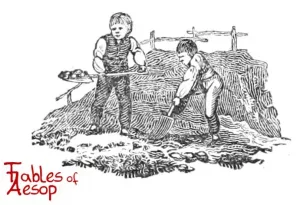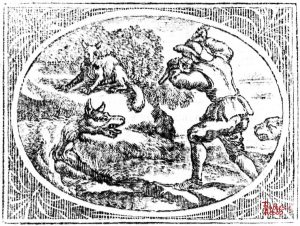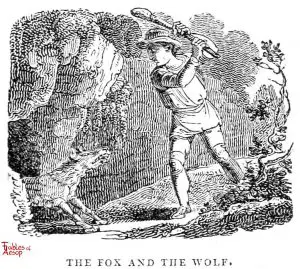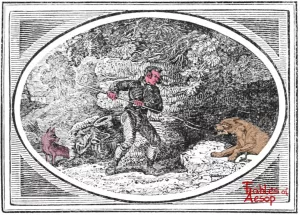A Fox knew a Wolf was holed up and told a Shepherd where the den was. Shepherd killed Wolf and Fox moved into den. Shepherd came back. Bye, bye Fox.
Take pleasure when thieves destroy themselves.

JBR Collection
A Wolf who lived in a cave, having laid in a good store of provisions, kept himself very close, and set to work to enjoy them. A Fox, who missed the Wolf from his usual haunts, at last found out where he was, and, under pretence of asking after his health, came to the mouth of the cave and peeped in. He expected to be asked inside to partake, but the Wolf gruffly said that he was far too ill to see anybody. So the Fox trotted off again, in anything but a charitable state of mind. Away he went to a Shepherd, and told the Man to provide himself with a good stick and come with him, and he would show him where to find a Wolf. The Shepherd came accordingly, and killed the Wolf. The Fox thereupon took possession of the cave and its stores. He did not, however, long enjoy the fruits of his treachery, for the Man, passing by that way a few days after, looked into the cave, and seeing the Fox there, killed him too.

Samuel Croxall (The Fox and the Wolf)
THE Wolf having laid in store of provision, kept close at home, and made much of himself. The Fox observed this, and thinking it something particular, went to visit him, the better to inform himself of the truth of the matter. The Wolf excused himself from seeing him, by pretending he was very much indisposed. All this did but confirm the Fox in his suspicions: so away he goes to a Shepherd, and made discovery of the Wolf, telling him he had nothing else to do but to come with a good weapon, and knock him on the head as he lay in his cave. The Shepherd followed his directions, and killed the Wolf. The wicked Fox enjoyed the cave and provisions to himself, but enjoyed them not long, for the same Shepherd passing afterwards by the same hole, and seeing the Fox there, dispatched him also.
THE APPLICATION
This fable seems to be directed against the odious trade of informing. Not that giving information against criminals and enemies of the public, is in itself odious, for it is commendable; but the circumstances and manner of doing it, oftentimes make it a vile and detestable employment, He that accuses another, merely for the sake of the promised reward, or in hopes of getting his forfeited estate, or with any other such mercenary view, nay, even to save his own life, whatever he gets by the bargain, is sure to lose his reputation. For, indeed, the most innocent company is not safe with such a one in it, nor the neighbourhood secure in which he lives. A villain of his stamp, whose only end is getting, will as soon betray the innocent as the guilty: let him but know where there is a suspected person, and propose the reward, and he will scarce fail to work the suspicion up to high treason, or be at a loss to give sufficient proofs of it. We have no small comfort concerning this sort of people, when we consider how improbable it is that they should thrive or prosper long in their ill-gotten possessions. For he that can betray another, for the sake of a little pelf, must be a man of such bad principles, that it cannot be for the interest of any community to suffer him to live long in it. Besides, he himself will not be contented with one single villany; and there is no fear but he will provoke justice to hurl down upon his head, at least, as great a calamity as he, by his malicious information, has brought upon another.

Thomas Bewick (The Fox and The Wolf)
The Wolf having laid in a store of provisions, snugly kept in his den, and indulged himself in feasting upon them. The Fox observing this seclusion of the Wolf, became inquisitive to know the cause, and by way of satisfying his curiosity and his suspicions, he went and paid the Wolf a visit. The latter excused himself from seeing the Fox, by pretending he was very much indisposed. The Fox having smelt how matters stood, took his leave, and immediately went to a Shepherd to inform him of the discovery he had made, and that he had nothing else to do but to take a good weapon with him, and with it easily dispatch the Wolf as he lay dosing in his cave. The Shepherd following his directions, presently went and killed the Wolf. The wicked Fox then slily took possession of the cave and the provisions to himself; but he did not enjoy them long, for the same Shepherd shortly afterwards passing by the place, and seeing the Fox there, dispatched him also.
APPLICATION.
A villain, whose only aim is to get what he can, will as soon betray the innocent as the guilty. Let him but know where there is a suspected person, and propose a reward, and he will seldom fail to work the suspicion up to high treason, and will be at no loss to produce sufficient proofs of it. Men of this stamp will not be content with practising one single villainy; for having never laid down any good principles for their guide, they will go on triumphantly in their wickedness for a time, and though, perhaps, they may be the instruments of bringing other villains to punishment, yet they will at last suffer in their turn; for, after being detested by all good men, justice will, sooner or later, overtake their crimes, and hurl down its vengeance on their heads, with a measure equal at least to the sufferings their perfidy has occasioned to others. The fate of such wretches can never excite the smallest commiseration; for no character is so truly detestable, as that of a spy and informer.


L’Estrange version
A wolfe that had a mind to take his ease, stor’d himself privately with provisions, and so kept close a while. Why, how now friend says a fox to him, we han’t seen you abroad at the chace this many a day! Why truly says the wolfe, I have gotten an indisposition that keeps me much at home, and I hope I shall have your prayers for my recovery. The fox had a fetch in’t, and when he saw it would not fadge; away goes he presently to a shepherd, and tells him where he might surprize a wolfe if he had a mind to’t. The shepherd follow’d his directions, and destroy’d him. The fox immediately, as his next heir, repairs to his cell, and takes possession of his stores; but he had little joy of the purchase, for in a very short time, the same shepherd did as much for the fox, as he had done before for the wolfe.
Moral
‘Tis with sharpers as ’tis with pikes, they prey upon their own kind: and ’tis a pleasant scene enough, when thieves fall out among themselves, to see the cutting of one diamond with another.

Vulpes Aemula et Lupus
Lupus praedam multam in cubili congregaverat ut plures menses haberet quo vivere posset. Vulpes ad eius cubile venit et, aemula, lupo dixit, “Quia non vidi te per tot dies, merito tristis fui.” Cui lupus, ut agnovit livorem, ait, “Non ad me sollicita venisti, sed ut aliqua rapias.” His verbis vulpes irata, pastorem adiit. “Agis mihi gratias,” inquit, “si tibi inimicum gregis tui hodie in manus tradidero, ut iam non sis sollicitus?” Pastor ait, “Ego serviam tibi, et siquid volueris tibi tradidero.” Tunc clausum illa ostendit lupum, quem lancea ille peremit, et aemula vulpes se de alieno saturavit. Deinde ipsa in venatorem cum incideret, deprehensa a canibus et laniata, sic ait, “Ego male feci et male modo pereo, quae alterum laesi.”
Perry #568


